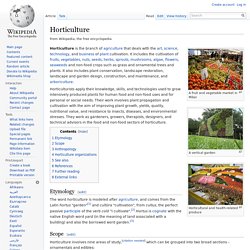

Systemics. In the context of systems science and systems philosophy, the term systemics refers to an initiative to study systems from a holistic point of view.

New Research Shows Climate Emissions from Keystone XL Tar Sands Pipeline Much Worse Than Reported. New Research Shows Climate Emissions from Keystone XL Tar Sands Pipeline Much Worse Than Reported Proposed Export Pipeline Will Significantly Expand Tar Sands Industry January 17, 2013 – Scientists and advocates today unveiled new research showing that the Keystone XL tar sands pipeline would damage the climate much more than previously thought, by dramatically expanding tar sands production and because it will lead to increased combustion of a particularly dirty form of oil.
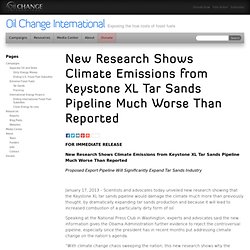
Speaking at the National Press Club in Washington, experts and advocates said the new information gives the Obama Administration further evidence to reject the controversial pipeline, especially since the president has in recent months put addressing climate change on the nation’s agenda. Petcoke is commonly used as a cheaper, more carbon-intensive substitute to coal—and the petcoke in tar sands is turning American refineries into coal factories.
Bruce Fein: Mankind On The Stage of History — How Will We Be Remembered? Voiceandexit. Atomic Midnight. Ddrrnt. Nepali Times. You Are the Network. CCAFS: CGIAR research program on Climate Change, Agriculture and Food Security. Zanzibar Mangroves. The Menai Bay Conservation Area (MBCA) is located in Menai Bay, Zanzibar Tanzania.
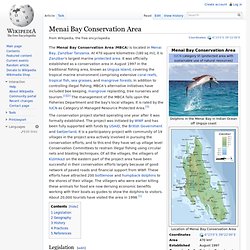
At 470 square kilometres (180 sq mi), it is Zanzibar's largest marine protected area. It was officially established as a conservation area in August 1997 in the traditional fishing area, known as Unguja Island, covering the tropical marine environment comprising extensive coral reefs, tropical fish, sea grasses, and mangrove forests. In addition to controlling illegal fishing, MBCA's alternative initiatives have included bee keeping, mangrove replanting, tree nurseries and tourism.[1][2] The management of the MBCA falls upon the Fisheries Department and the bay's local villages. It is rated by the IUCN as Category VI Managed Resource Protected Area.[3] The conservation project started operating one year after it was formally established.
Legislation[edit] Marine Reserves were designated in 1975 but were not legislated. Geography[edit] History[edit] Practices[edit] Indo-Pacific humpback dolphins. Picture Framing - Blog. Helene Finidori. The finalists of the Knight Foundation News Challenge were announced on April 13th, and unfortunately, our project did not make it.

We will nonetheless pursue it as we believe time has come for such a platform to become a reality. Here is where we are at, just a few weeks after framing the project and bringing it from an idea to a possibility. Our Advisory & Concept/Project Development team has grown nicely: What I love in the process is that this is already an emergence platform: I announced that we would endeavor to bring "edge thinkers and doers into the process for advancement of platform design in the fields of learning and action research, social change, governance, institutions, participatory politics, collective action, sustainability, business, collaboration, design and systems thinking, linguistics, semantic web. " Well this is manifesting as we speak!
If I had a 'mission statement' to write, as of today it would be: What the Comments Tell Us: The positive: The Advice Offers for help. Agriculture. Agriculture, also called farming or husbandry, is the cultivation of animals, plants, fungi, and other life forms for food, fiber, biofuel, medicinals and other products used to sustain and enhance human life.[1] Agriculture was the key development in the rise of sedentary human civilization, whereby farming of domesticated species created food surpluses that nurtured the development of civilization.
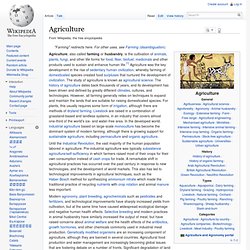
The study of agriculture is known as agricultural science. The history of agriculture dates back thousands of years, and its development has been driven and defined by greatly different climates, cultures, and technologies. However, all farming generally relies on techniques to expand and maintain the lands that are suitable for raising domesticated species. For plants, this usually requires some form of irrigation, although there are methods of dryland farming. Until the Industrial Revolution, the vast majority of the human population labored in agriculture. Agroforestry. Land use management system Agroforestry is a land use management system in which trees or shrubs are grown around or among crops or pastureland.
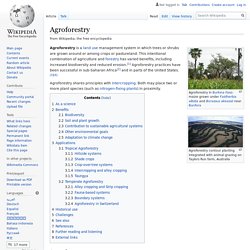
This intentional combination of agriculture and forestry has varied benefits, including increased biodiversity and reduced erosion.[1] Agroforestry practices have been successful in sub-Saharan Africa[2] and in parts of the United States.[3][4] Agroforestry shares principles with intercropping. Both may place two or more plant species (such as nitrogen-fixing plants) in proximity. Agroforestry contour planting integrated with animal grazing on Taylors Run farm, Australia As a science[edit] According to Wojtkowski, the theoretical base for agroforestry lies in ecology,[5] or agroecology.
Benefits[edit] Agroforestry systems can be advantageous over conventional agricultural and forest production methods. Horticulture. A fruit and vegetable market in Milan Horticultural and health-related produce Horticulturists apply their knowledge, skills, and technologies used to grow intensively produced plants for human food and non-food uses and for personal or social needs.
